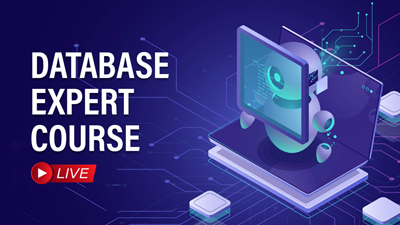 Live Classes
Live Classes
Database Expert Course
4.9 (24922 Reviews)A database expert, also known as a database administrator (DBA) or database engineer, is a professional responsible for designing, implementing, managing, and maintaining databases. Their expertise revolves around various database management systems (DBMS), ensuring efficient data storage, retrieval, security, and integrity.
Learn More →
Buy Courses
Upcoming Batch Details.
Duration
- (Mon - Sat) 5 Months
- (Mon - Sat) 5 Months
- (Mon - Sat) 5 Months
- (Mon - Sat) 5 Months
- (Mon - Sat) 5 Months
Timings
- 9:00 AM to 10:00 AM
- 10:00 AM to 11:00 AM
- 4:00 PM to 5:00 PM
- 5:00 PM to 6:00 PM
- 6:00 PM to 7:00 PM
Course Fees
Get 50% off
Exciting Offer till 06 Nov
Find Course Fees →No Cost EMI options available
Overview of Our Database Expert Course
Design and Implementation: Database experts design database structures that meet application requirements efficiently. They create schemas, tables, relationships, and optimize queries for performance.
Performance Tuning: They monitor and optimize database performance by fine-tuning configurations, indexing strategies, and query optimization to enhance speed and efficiency.
Security Management: Database experts implement security measures to protect sensitive data, establishing access controls, encryption, and ensuring compliance with regulations like GDPR or HIPAA.
Backup and Recovery: They develop and execute backup and recovery strategies to prevent data loss, ensuring the availability of data in case of system failures or disasters.
Database experts possess knowledge of various database technologies such as relational databases (e.g., MySQL, PostgreSQL, SQL Server), NoSQL databases (e.g., MongoDB, Cassandra), cloud-based databases (e.g., Amazon RDS, Azure SQL Database), and data warehousing solutions.

Curriculum of Database Expert Course
Well-structured & comprehensive curriculum designed according to latest trends and industry standards!
-
Understanding Databases
- Definition and types of databases (relational, NoSQL, etc.).
- Importance of data management.
-
Relational Database Basics
- Tables, rows, and columns.
- Primary keys and foreign keys.
-
Popular RDBMS
- Overview of databases like MySQL, PostgreSQL, Oracle, SQL Server.
- Choosing the right database for specific use cases.
-
Installing and Configuring a Database Server
- Setting up MySQL or PostgreSQL.
- Configuring security settings.
-
Introduction to SQL
- Basic SQL syntax.
- SELECT, INSERT, UPDATE, DELETE statements.
-
Advanced SQL Queries
- JOIN operations.
- Subqueries and nested queries.
- Aggregation functions.
-
Database Design Principles
- Entity-Relationship Diagrams (ERD).
- Normalization and denormalization.
-
Indexing and Performance
- Understanding indexes.
- Optimizing queries for performance.
-
Introduction to NoSQL
- Types of NoSQL databases (document, key-value, graph, etc.).
- When to use NoSQL databases.
-
MongoDB Basics
- Document-oriented database.
- CRUD operations in MongoDB.
-
Schema Design in NoSQL
- Modeling data for NoSQL databases.
- Understanding flexibility in schema design.
-
Cassandra and DynamoDB
- Overview of wide-column store databases.
- Data modeling in Cassandra.
-
Database Security
- Authentication and authorization.
- Securing data at rest and in transit.
-
Backup and Recovery
- Creating database backups.
- Strategies for data recovery.
-
Vertical and Horizontal Scaling
- Scaling up vs. scaling out.
- Sharding and partitioning data.
-
Replication
- Master-slave and master-master replication.
- High availability and fault tolerance.
-
Stored Procedures and Triggers
- Writing stored procedures.
- Using triggers for automation.
-
Data Warehousing
- Introduction to data warehousing concepts.
- OLAP vs. OLTP.
-
Database as a Service (DBaaS)
- Overview of cloud databases (Amazon RDS, Azure SQL Database)
- Migrating databases to the cloud.
-
Serverless Databases
- Serverless architecture for databases.
- Pros and cons of serverless databases.
-
Introduction to Big Data
- Handling large volumes of data.
- Hadoop and distributed data processing.
-
Database Integration with Big Data Tools
- Connecting databases to Apache Spark, Apache Flink, etc.
- Real-time data processing.
-
Data Encryption
- Encrypting data at rest and in transit.
- SSL/TLS for secure connections.
-
Compliance Standards
- GDPR, HIPAA, and other data protection regulations
- Ensuring compliance in database management.
-
Database Monitoring Tools
- Overview of tools like MySQL Workbench, pgAdmin, etc.
- Monitoring performance metrics.
-
Query Optimization
- Analyzing and optimizing SQL queries.
- Index optimization and query execution plans.
-
Version Control for Databases
- Managing database schema changes.
- Tools like Liquibase and Flyway.
-
Continuous Integration and Delivery for Databases
- Integrating database changes into CI/CD pipelines.
- Automated testing of database changes.
-
Blockchain and Databases
- Integrating blockchain with databases.
- Use cases for blockchain in database management.
-
Graph Databases
- Overview of graph databases (Neo4j, Amazon Neptune).
- Use cases for graph databases.
Why Choose Codelearn.academy ?

Training by Pro Web Developers
In this course, you will get complete training and practice sessions from a professional and expert website developer who has 10+ years of experience in the field.

Most Comprehensive Curriculum
We offer the most detailed training, covering all aspects of web development in-depth. You learn both static and dynamic website development.

Intensive Classroom Training
To offer you the best learning experience, our classrooms are fully digitized, distraction-free, and provide 1:1 personal interaction with the mentor.

Hands-on 12 Live Projects
Web development is a skill that requires immense practice. For that, you will work on a total of 12 projects (both dynamic and static websites).

Job Assistance
We prepare you for the web development interview, and arrange your interviews with top companies so that you can kickstart your career instantly after the course.

Web Development Certification
Once your training is over, you get a professional certificate that you can add to your resume and easily explore promising career opportunities.
